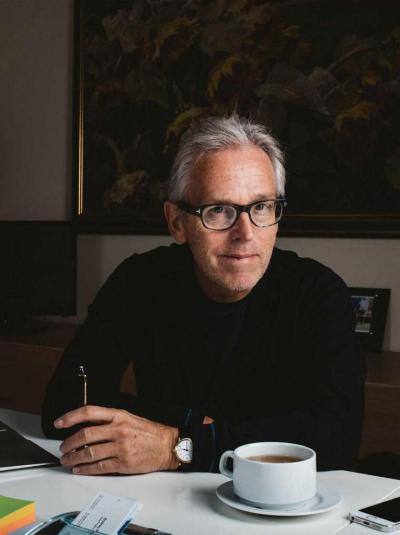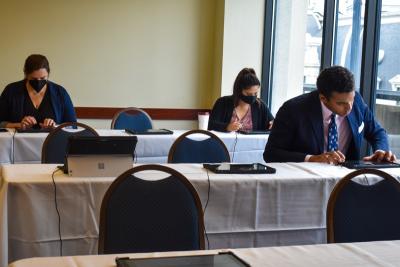In honor of World Press Freedom Day on May 3, members of the National Press Club’s Press Freedom Team prepared interviews with journalists in exile from around the world. This is another in a series featuring their stories to shed light on press freedom issues worldwide.

Dutch media magnate Derk Sauer, the founder of the Moscow Times and Vedomosti and CEO of RBK, fled Russia with his family and colleagues after Russian President Vladimir Putin enacted legislation that banned journalists from spreading “disinformation” — especially about the invasion of Ukraine.
Sauer spoke with the National Press Club about moving his newsroom to Amsterdam, the dangers faced by reporters still in Moscow, and the media hubs he is building in Europe to help journalists from other independent Russian outlets.
Tell me about the mission of the Moscow Times, especially at this particularly crucial moment in its history.
Sauer: The Moscow Times has a long history because it was founded in 1992 at the very beginning of Russia: perestroika, Gorbachev, Yeltsin, all that. Initially, it was a print newspaper published in Moscow, focused on the expat community that was growing fast.
Times have changed enormously. Ninety percent of the expat community has left Russia, and the Moscow Times has become an international digital brand, with two services — an English-language service, but since the beginning of the year, also a Russian-language service.
And the timing is incidental. We didn’t know that a war would be coming. But of course, the timing could not have been better [for] launching a Russian-language service. We had another Russian-language platform called VTimes, set up by journalists who left the business newspaper Vedomosti, which I also founded, which was taken over by the Kremlin. But we were the second to be declared as a foreign agent in Russia, after Meduza, the second media. And we had to close that down because we lost all our advertising.
But as I said, in January, just before the war, we launched the Russian service of the Moscow Times. And that is now of course, a very important channel to reach people in Russia. And we have a much, much bigger international audience than we ever had when we were a print newspaper.
Q: How much of your staff is able to still work independently and safely in Russia after this new law?
Sauer: Like everyone else, our newspaper was already declared a foreign agent. So we already had to be very careful even before the war because we were under scrutiny of the authorities.
But when the war broke out, of course, all rules went out the window. And basically, it was a choice between following the rules, which meant not being a journalist anymore because you could not say a war is war and you could not publish independent information about the war, or leave the country.
This was a dilemma that every independent platform faced in Russia. We decided that we wanted to continue — and the only way to do that was to leave Russia.
So basically overnight, these were very chaotic days. Two weeks, three weeks into the war, where people — literally in two, three days, with one suitcase — left the country initially not even knowing where to go because it was very difficult to get flights out of the country. So people jumped on the first tickets they could get out of the country.
But finally, we assembled ourselves in Amsterdam because I’m a native of the Netherlands. So it was logical for me. I have a lot of contacts there and a lot of friends to move back to Amsterdam, where we set up a newsroom.
Q: What about your own move to Amsterdam? Was it smooth just given your citizenship there, or were there complications given how rushed that process was?
Sauer: I have a Dutch passport, so I could go. There were no direct flights anymore. Last minute, we got some tickets on a flight to Istanbul. And so when I was in Istanbul, I didn’t know what to do next. So basically, I picked up the phone and called some friends and colleagues at Dutch media organizations, and I explained the situation.
And the chairman of a company called DPG, which is one of the largest Belgian-Dutch media houses, said immediately, “Derk, be my guest, you’re welcome, come to our office. We’ll facilitate you and your journalists.” So for us, it was actually pretty smooth.
And we were extremely fortunate. We also had very good support from the Dutch embassy in Moscow, who issued visas, like, overnight, to my Russian team. So we were very fortunate. Basically when we arrived, the newsroom was waiting. We literally walked into a ready newsroom with desks and computers and the whole thing. We were off the air for four days, and we immediately could relaunch the website.
Of course, it was hectic. Leaving Moscow meant we left all our equipment, all our bank accounts. Because of the sanction all the bank accounts were frozen. So we had no money, we had no equipment, we had nothing. We just literally came with one suitcase.
And we had no houses. But I had another friend who has a hotel chain in Amsterdam. And I called him and said, “Can we stay for a few nights?” He said, “You know, you can stay for two months. Take your whole team, put them in one of my hotels, I have space.” So even there, we had tremendous support.
Q: Talk to me about the degree to which you’re able to do independent journalism on Russia without physically being in the country?
Sauer: I must say, of course, the last thing you want is to report about your country while being in another country. I mean, in Moscow, we just walked on the street or took the train to other cities and reported.
Now there are two things that are important. One is we just had the COVID experience and in Russia, there was a very strict lockdown. So for basically over a year, we did not report from our newsroom, but we reported from home because we were not allowed to be in our newsroom. So looking back, that was a tremendous experience, in a way, to learn how to operate when you’re not all together. And the Moscow Times actually had wonderful scoops the whole time in the COVID period. We were probably the best newspaper reporting the COVID crisis in Russia, where over one million people lost their lives. We already forgot all these huge numbers, but in Russia, COVID was like an incredible drama. And we did report it very well while not being on the street.
Second is we left people behind in Moscow because we have a team of about 25 people. We took 10 people to Amsterdam. And the rest for several reasons – some had to take care of their parents, had small children that they did not want to relocate, or other personal reasons – people stayed behind.
And from day one we decided, when the war started, that we would not mention any bylines, any names of our staff in the newspaper. People did not report from the newsroom anymore, they basically went underground because they were breaking the law. But they are still there. They’re still reporting.
So I would say our editing team is in Amsterdam. But some of our reporters and many of our freelancers – because we also, like all media, use freelancers – are still in Russia at the moment. And for them, it’s quite dangerous.
Q: Can you talk about their safety? Are they able to maintain their anonymity and still do their job and talk to sources and get the information that your readers need?
Sauer: Well, officially, they don’t work because they cannot work. The nature of how we operate has dramatically changed. One is the journalists cannot identify themselves [by their] bylines.
But they also have to be very careful to present themselves to sources, so they can only talk to trusted sources. They cannot go to press conferences, and so on. One of our reporters was recently arrested near the border with Ukraine. Thank God, he was released and basically kicked out of the country. So he’s now in Yerevan. So you have to be extremely careful.
And normally we are extremely strict at the Moscow Times with quoting sources: always names, always check and double check. But unfortunately, that’s impossible now. If you talk with someone in the government, this person is never, ever going to agree to use his or her name because it would be the end of their careers. We have a very good reporter, he is one of the best Kremlin-connected reporters. So he still has a lot of sources inside. But he cannot name any of the sources he quotes.
Q: That’s interesting, so he can talk to people in the Kremlin but couldn’t go to a spokesperson to get an official comment like you would in a more formal setting?
Sauer: You cannot do that, no, no. So he speaks to them privately, through Telegram, Signal, and other safe apps or just in a car in a park. Just like during the Stalin days. It’s that type of journalism. It’s totally different from what we were used to when we were operating in the Yeltsin [era] and the first, I would say, eight Putin years.
Q: A lot of our focus obviously has been on Evan Gershkovich, the American journalist who the U.S. government and the National Press Club has said was wrongfully detained by Russia on charges of espionage.
Sauer: He started his career at the Moscow Times. When he worked in the U.S. and wanted to come to Moscow, he wrote me a letter saying that he passionately wanted to be a journalist. And Moscow Times is a great starting place for young, ambitious reporters.
And so he worked for us for four years. And then together with my son Pjotr Sauer – who also was a young reporter at the Moscow Times – they worked closely together, and they are best friends. And they wrote all these scoops about COVID and some other very good stories.
And they were picked up, Evan by The Wall Street Journal and Pjotr went to The Guardian. And that’s the interesting thing about the Moscow Times, if you look at the alumni list of the Moscow Times, these people are all over the place. FT, New York Times, Boston Globe, Guardian, you name it. Everywhere, you find former Moscow Times reporters, and Evan is of the last generation of this group of people.


